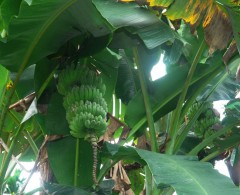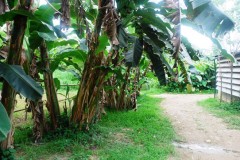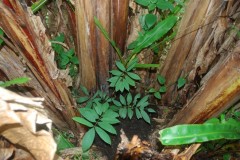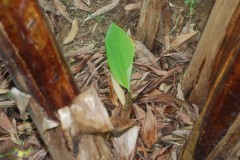Apr 26, 2010
Permaculture is Bananas
Banana plants (it's a giant herb) can make their own food, retain water, and in our farm continuously produce 20 to 40 kg bunches without significant input.
Banana plants at our farm. Producing fruits year after year in the same spot without replanting.
Nowadays farmers grow rows and rows of tissue-cultured clones. These require high fertiliser and fungicide inputs.
At our farm, the banana epitomises permanent agriculture. We use our human intelligence to plant them at the right place - they like moisture and organic material. They will form a clump - trim the clump to about 4 to 5 plants so that they will produce reasonable sized bunches
A banana clump serves as a heat absorber. They cool down the earth due to their ability to retain water and reduce radiation of heat to buildings due to their shady leaves.
The centre of the clump hosts myriad microbes and earthworms due to its dark and moist conditions rich in organic matter. They quickly break down fallen leaves, dead trunks, etc into humus and then release these nutrients back to the clump as food. We only need to occasionally supplement with some compost and some chopped dead trunks.
We plant tuba or derris elliptica in the centre. The clump provides all the nutrients that the derris require. We don't even need to water the derris.
Derris in the clump :).
We have found that gingers do well in the clumps too. Gingers love organic matter and moisture. We are now planting ginger in all the clumps in the farm as a cash crop.
This temu kunci is growing at a faster rate than others planted outside the clump.
We, humans, have a choice - clear the land, plant rows and rows of clones and hybrids, feed them with synthetic nitrogen-based fertilisers and spray them with fungicides and due to the low contribution margin for such crops, go for 'volume', ie clear up more land to generate this 'volume';
Or go the permaculture way - use nature intelligently and work with nature to produce food for us for generations. We may not be rich in the short term, but we will be around for a far longer time. Multiple this idea by 100,000 farms and the landscape of the Earth's future changes!
16:44 Posted in Permaculture | Permalink | Comments (4) | Tags: permaculture, bananas, raised beds, compost, derris elliiptica, temu kunci, boesenbergia rotunda












Comments
yes today we also planted some bananas & tapioca =)
Posted by: haslinda | Apr 26, 2010
Great tip about growing ginger in the heart of the clump...gonna give it a try. I never know when to harvest my bananas. I always thought it was when the last petal fell from the flower but recently I was told that wasn't true. Anyone like to enlighten me?
Posted by: Mary Maguire | May 24, 2010
When one or two bananas in the bunch starts to yellow, it's time. When harvested at this age, the rest of the bunch will ripen well.
Posted by: HS | May 25, 2010
your site is great, my friends and I we are planing to build Eco village, I found many useful information here. will share it and come back to for advices. thanks good people!
Dejan
Posted by: Dejan | May 29, 2011
The comments are closed.